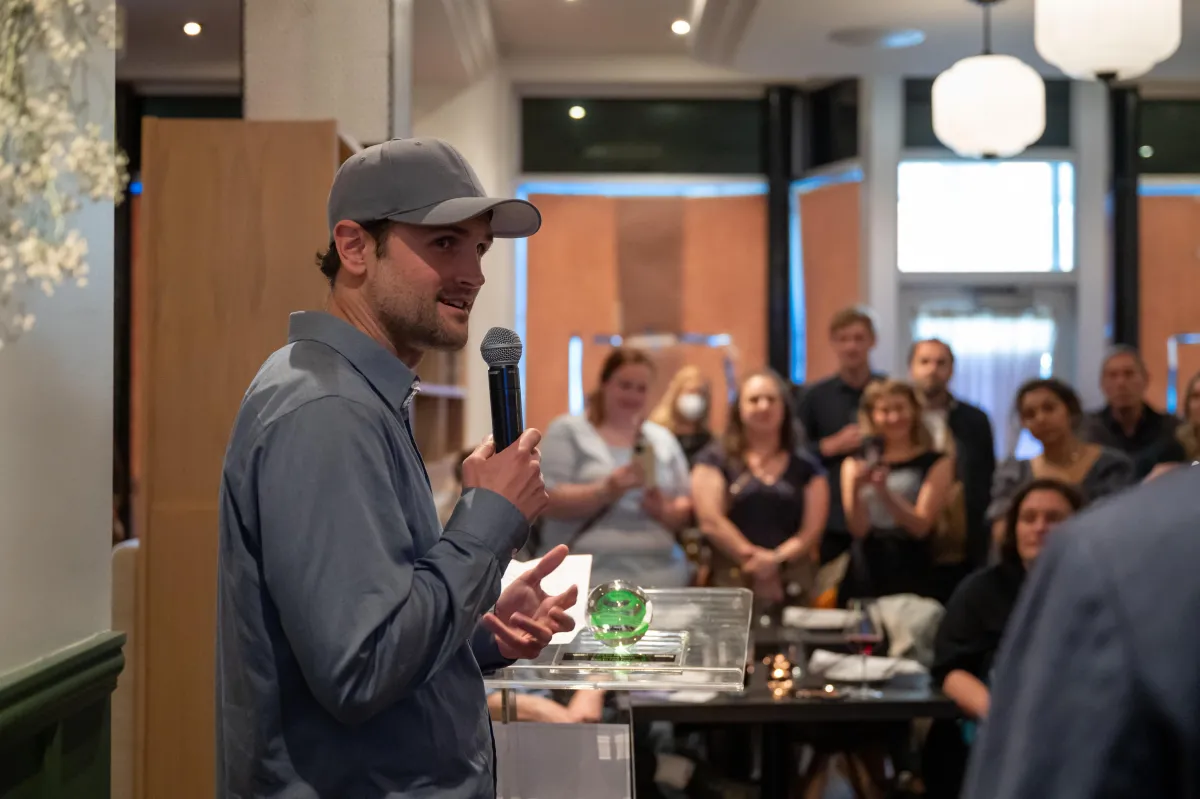
Doc10's 2023 Vanguard Award Recipient Shane Boris Urges Risk-Taking in Producing

After conferring the inaugural Vanguard Award to Jessica Devaney in 2022, Doc10 selected Oscar-winning producer Shane Boris as this year's recipient for "documentary producers and filmmakers who are at the forefront of creating and cultivating innovative and important documentary filmmaking." Earlier this year, Boris was nominated twice for the Academy Award for Best Documentary as a producer of both Daniel Roher's Navalny (the winner) and Sara Dosa's Fire of Love, and was first nominated in 2020 for Petra Costa's The Edge of Democracy.
At an awards ceremony on the evening of Saturday, May 6, at the Davis Theater, Doc10 also joined a recent chorus of documentary institutions in honoring Jean Tsien, who received the Luminary Award for "members of the documentary film community who help to make powerful films that shine a light on vital social issues," citing the long-time editor and producer's influence "nurturing emerging talent" as an advisor at Sundance, Camden/TFI, Catapult/T/F, Chicken & Egg, and many other lab and talent mentoring/development programs.
Doc10, Chicago's only all-documentary film festival, is a project of CMP, formerly known as the Chicago Media Project. CMP is a nonprofit collective best known for funding impact-driven documentary films, and which has recently expanded into presenting community film events and other ways to support progressive and mission-aligned organizations.
The following is the text of Shane Boris' acceptance speech, courtesy of Doc10 and Shane Boris.
New Stories Need New Ways of Storytelling
By Shane Boris
I believe producing to be, at its core, helping fellow filmmakers understand their vision, even when it’s still embryonic and confusing, and then working with them to find ways of expressing and actualizing that vision. For me, producing is never about trying to impose my idea of what a film should be. It is always about, as selflessly as possible, listening to the ever-evolving potential of a film and doing everything I can to help allow that potential to manifest in the world.
Just as most individuals don’t know who they want to be, until they do, most films don’t know what they want to be, until they do. Many of us here know that moment in a fine cut when the narrative structure seems to all of a sudden cohere. Or the thrill of a brainstorm session when you’ve finally landed upon your film’s thesis from which the soul of the film bursts forth.
I believe that one of the most important jobs of the producer is to help create the conditions for that moment and for the expression of that self-knowledge.
This requires a practice of selflessness and compassion. And a commitment to the underlying value and meaning of the project, so that every decision that is made is made with an intentionality and integrity that speaks to—and upholds—the mysterious essence of the film. This requires the other parts of our job, too: It takes finding the resources that can give you the freedom and spaciousness to do what you believe you need to do. It takes strategic and organized planning and implementing. It takes teammates who act ethically and who can support your strengths, supplement your weaknesses, challenge your firmest held beliefs and inspire you to be the best version of your creative self. It takes an industry that supports daring films, films that don’t seek to perpetuate static ways of living but offer new ways of seeing the world and fresh attempts at alleviating some of its unnecessary suffering.
For those of us here who care about innovative, impact-driven storytelling, we know that films often start with a mission. Expose the corruption and oppressiveness of anti-democratic and authoritarian regimes as we tried to do in The Edge of Democracy and Navalny. Help people see that all life on earth is sentient and interconnected and deserves to be loved and cared for, not exploited and disregarded, as we tried to do in The Seer and the Unseen, Stray, and Fire of Love. Shine a light on systems of power that exploit laborers and perpetuate the heinous myth of American exceptionalism and Western and white superiority, as we tried to do in The Last Cruise.
But I believe that it is impossible to animate a mission without first striving for compelling and revelatory narratives that have surprising associations and aesthetics that strive for the cinematic. Our mantra on King Coal toward the end of editing was: new stories need ways of storytelling. Doing so, I hope, can work towards breaking cycles of misrepresentation, which can become a liberating act.
I know this industry feels frightening right now. There is a place for all kinds of filmmaking, but some of us must continue to resist the same old true crime and salacious celebrity stories; we need to refuse maudlin and reductive narratives of a status quo reality or good vs evil worldviews. We need to be bold and tell and support the stories that speak to this moment and make the under-represented represented and the under-seen parts of our lives our priorities.
In accepting this award, which I will try to be worthy of, it is my hope that the films I work on in the future and documentaries in general can be a vehicle for getting us closer and closer to understanding and truth, even if we’ll never fully get there. My hope is that we can support each other in telling stories with both immediate and existential significance that help us move toward more love and healing for our broken yet still wonderful world.